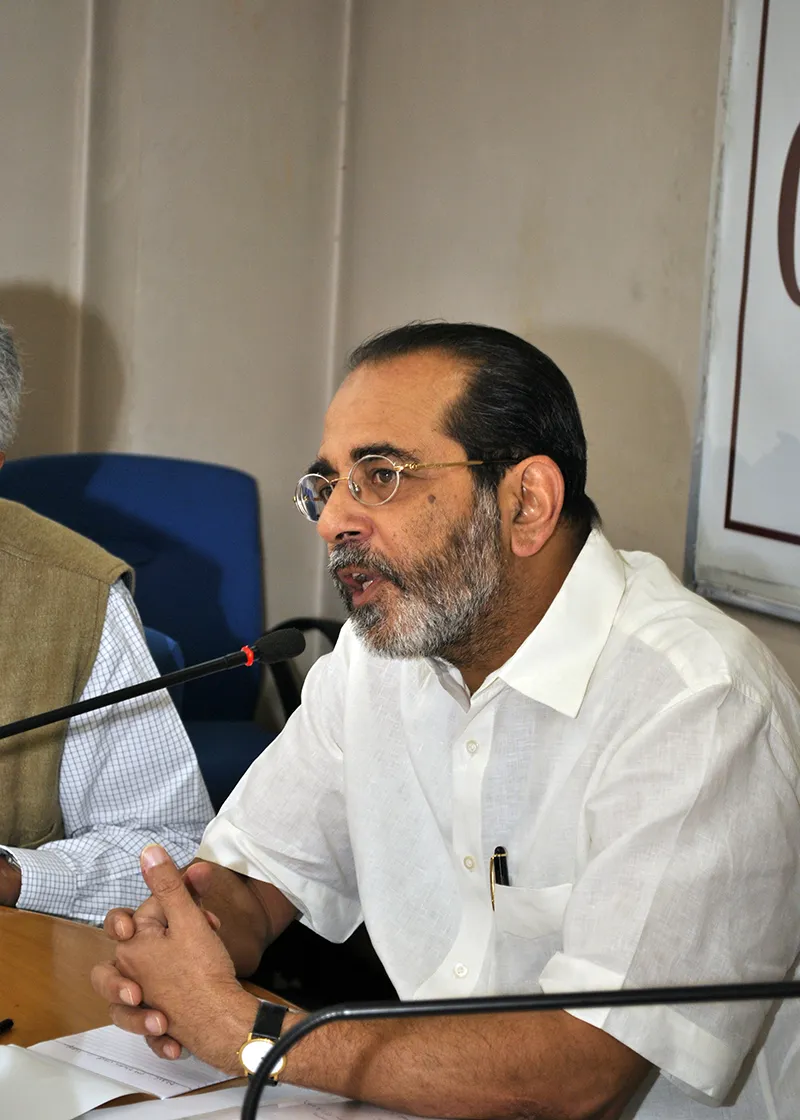-
CENTRES
Progammes & Centres
Location
Former Ambassador to Nepal Jayant Prasad says that the relationship between India and Nepal should not depend on the number of projects or the amount of credit sanctioned. It should be a more sensitive political relationship.

Observer Research Foundation, New Delhi, on 13 August 2014, hosted a discussion on "Assessing Prime Minister Modi’s visit to Nepal: The Challenges Ahead". The Chair for the session, Dr. C. Raja Mohan, began the discussion by pointing out the new government’s indicated intentions towards building better relations with India’s neighbours. The Prime Minister’s visit received overwhelming media attention on both sides of the border. A distinguished panel of experts took part in the discussion to analyse the achievements of the visit and the real challenges that need be addressed.
Amb. Rakesh Sood, who has served as India’s ambassador to Nepal, said that although there have been a number of visits from Nepal to India every year and high level political interactions have been frequent, the issue of reciprocity from India has always remained an impediment in India-Nepal relations. Mr. Modi’s visit so early in his term addresses this issue and reflects the kind of importance he has given to Nepal. The Prime Minister’s next visit in November for the SAARC summit and the convening of a Joint Commission after 23 years adds flavour to his visit to Nepal.
Amb. Sood went on to say that after the 2002 SAARC visit of the then Prime Minister Atal Bihari Vajpayee, there have not been any Prime Ministerial visits to Nepal. This can be attributed to apprehensions of the political misconstruing of such a visit given the highly unstable and constantly under-transition political situation of Nepal. He said that the visit is a bold gesture by the new government to cement relations despite the persisting uncertain political situation in Nepal. Despite Prime Minister Modi’s successful speech, which addressed the Federal Republic of Nepal putting to rest any notions of India’s support to the Monarchy, as well as the promise of a 1 billion dollar line of credit, there are key issues between the two countries that remain to be resolved. The Prime Minister has also highlighted his willingness to revise or update the 1950 treaty. Ambassador Sood asserted that the real challenge lies in the implementation of the major economic and infrastructural projects before the goodwill generated by the visit evaporates.
Ms. Suhasini Haidar, Diplomatic Editor, The Hindu, opined that the visit and the speech, despite making an impact, did little to change the real situation between the two countries. She said that while the Prime Minister did reach out to the Nepalese public through many emotionally resonant points, he carefully kept away from the "mine-fields" including the usual rhetoric of counterfeit currency flow from Nepal and Maoist insurgencies. She noted that the achievements listed by the government as a consequence of the visit are basically extensions of the already existing promises and deals. The sandalwood offering to the Pashupatinath temple and the sanctions for Dharamshala are long standing promises of India to Nepal. She also mentioned that the line of credit offered to Nepal is not a new idea, given that such deals are already in existence with Bangladesh and a few African countries. She pointed out that the level of engagement with the neighbours has definitely been prioritised because of which the burden of expectations is also increasing. She reiterated Ambassador Sood’s point and said that the real challenge lies in the implementation of the promises made.
Mr. Prashant Jha, Associate Editor, The Hindustan Times and author of ’Battles of The New Republic: A Contemporary History of Nepal", began by saying that he sees Prime Minister Modi’s speech in Nepal as a "game-changer." He argued that Nepali insecurities of asymmetric size, economic appendage and water monopoly while dealing with India have been persistent in every bilateral equation so far. Mr Jha said that Mr. Modi packaged the already-existing announcements in such a way that these insecurities were addressed. He posited that Prime Minister Modi didn’t put forward anything new but managed to deliver the same points in a much more effective manner in comparison to his predecessor.
Mr Jha noted that while the speech was diplomatic and appealed to both, the extreme left and right voices of the political spectrum of Nepal, the Prime Minister was implicitly firm on certain points. He did not address the issue of Madhes which indicated that they cannot have unrealistic expectations of direct bilateral cooperation with New Delhi while bypassing Kathmandu. According to Mr. Jha, the key issue in the bilateral cooperation between the two is rooted in the political crisis in Nepal. The real test for the new Indian government is whether it will choose normal interstate relations with Nepal or if it will get dragged into Nepal’s internal politics, which may hinder ongoing projects.
Amb. Jayant Prasad said that the visit was perceived as a political assurance to Nepal, and as recognition of its exemplary peace process. He said that the relationship between India and Nepal should not depend on the number of projects or the amount of credit sanctioned. It should be a more sensitive political relationship. Nepal is still crossing the hurdle of putting a constitution in place as well as working through the major issues of federalism and the still undecided nature of government. Prime Minister Modi, in his speech assured the country that India will offer assistance in the manner and speed that the people of Nepal are comfortable with. Ambassador Prasad said that India has always had a very intimate relationship with Nepal, which was the main point the Prime Minister brought out through his visit.
(This report is prepared by Kaveri Ashok, Research Intern, Observer Research Foundation, Delhi)
The views expressed above belong to the author(s). ORF research and analyses now available on Telegram! Click here to access our curated content — blogs, longforms and interviews.